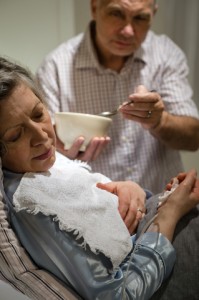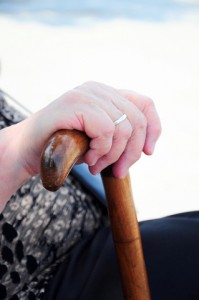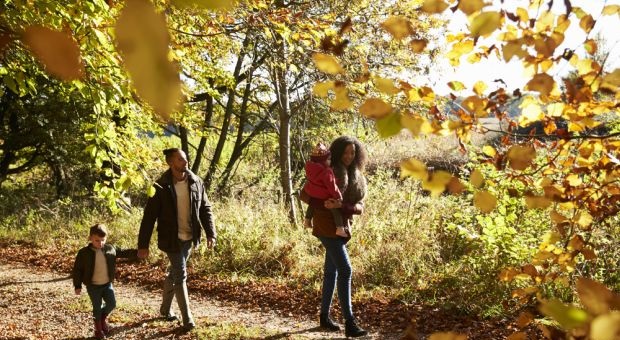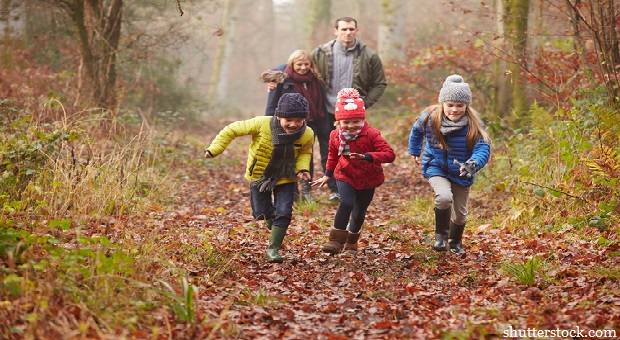Without a doubt, the best thing that you can do to help others in a SHTF situation is prepare in advance. You prepare for yourself for disaster but have you considered the advantages of getting your community involved?
Chances are good that even though you may feel all alone in your prepping efforts, there are many like-minded individuals right in your community. Work with other preppers to form a plan and include what to do to help the oldies in your area as well as people with other physical limitations and families with several kids.
In a SHTF situation, every single person in a group has some worth: sometimes the challenge is finding the best job for each person. Particularly if there are physical limitations such as those brought about by age or physical disability, utilizing your human resources to the fullest potential can require some creativity and forethought. That’s where a good leader will excel.
Before we even get into the process of assigning responsibilities to oldies, kids, and other people with physical considerations, let’s talk first about how to establish some organization so that when a SHTF situation arises, everybody knows what to do and can perform seamlessly as a team, to ensure the survival of the group.
Organizing in Advance
Get together with other preppers in your area and establish a committee with a defined leader and people who are assigned to be in charge of key areas such as food, defense, and medical needs.
{adinserter survivalmd}Make plans for leadership style after the SHTF, discuss different types of leadership and decide upon which type best suits the needs of your group. This will help to promote a feeling of normalcy as well as streamline the organizational process.
Choose a leader wisely and base your decision on the capability, integrity, and experience of the person for whom you vote. This person should be somebody that the entire group can trust, if not like. A good leader will have the experience and the creativity to use every resource in the group effectively and efficiently. Having established leaders will help the entire group remain cohesive in a disaster and will also promote feelings of security and community.
To ensure that a plan remains in place should something happen to your leader, it’s a good idea to choose a committee of responsible people with an established hierarchy. Committees also help distribute responsibilities and foster a feeling of ownership amongst your members.
Oldies and people with less physical capabilities shouldn’t be dismissed offhand for these roles because they can often contribute significantly to the group.
Discuss roles of each community member. While one person may have a huge pantry and kitchen that would serve as a mess hall for everybody, another may have a large storage area where medical supplies or other items of need may be stored. Utilize your resources.
Personal Roles after Disaster
Take into consideration every person’s abilities. Oldies and younger kids may not be able to perform many of the physical duties that able-bodied members can, but they can still fill vital roles when SHTF.
Consider for instance that somebody is going to need to keep track of supplies and monitor what goes out and what comes in. Fires may need tended and meals will need to be cooked. The group will also need somebody to watch the smaller children in defense situations or if search or hunting parties need to leave.
It’s important that every man, woman, and child has a role and that their particular strengths are utilized to the fullest. A good leader will be able to organize required tasks and put the best people for the job on them.
Most importantly, don’t discount somebody just because they’re older or physically less capable. In a SHTF situation, brains, creativity, and the ability to think effectively under duress are often more vital to survival than brawn.
Some Tips for Helping Others in a SHTF Situation

People aren’t going to be trusting and there will be those who did not prepare and will turn to looting and other acts of crime just to survive.
Emergency services aren’t going to be there for you so you must be prepared to take of yourself and fellow community members. This requires good planning.
Here are some final tips to help you help others and therefore help yourself.
- In order to be of help to anybody, you must first know them. Be an active member of the community and get to know your group. Establishing relationships is a great way to build trust.
- Know each member’s strengths and weaknesses, and plan around them.For instance, one person may have advanced medical training but is in a wheelchair. Plan accordingly to get that person front and center so that he or she is safe and those skills are utilized.
- Establish “buddy neighbors” for oldies or people with several small children. As soon as it’s safe, the buddy will check on those neighbors and help get them to safety.
- Make sure that everybody has a role. It not only expands your resources, it gives people ownership and a sense of responsibility. Having a job helps people remain calm when SHTF.
- Establish meeting places so that everybody knows where to go post-SHTF.
These are just a few ideas to take with you to your community meetings. The best part about working with others is that you have the advantage of brainstorming.
Establish your plans, and plan for contingencies and different SHTF situations. Every time that you meet to discuss and plan, you’re forming bonds and building trust, both of which will help you get safely through a crisis.









Old Food | January 2, 2014
|
We will need to separate three distinct kinds of people though if we are to be practical with our assistance. There will be those who are willing to do whatever they have to do to help out and be part of the solution. There will be those who because of age or infirmities cannot help themselves or anyone else much. Both are worth our assistance. Then there will always be those who are loafers, lazy or have just gotten used to having everything handed to them and cannot or will not readjust to a life without entitlements. My Bible tells me I have an obligation to those who are helpless but it also tells me those who don’t work don’t eat.
Deez | January 28, 2014
|
I would ask you, who’s going to be making the decision on who eats and who don’t? What one person considers lazy may actually be someone with a form of ADD. If you don’t understand and work with people, how will you know? Your reply has shades of judgement. Yes, someone has to judge but judge with the facts. Just bare in mind, just because you see something one way, doesn’t mean others see it the same way. I encourage you to at least find someone who takes the time to understand different types of people to be the judge, not someone who judges w/o taking the time to learn and understand.
Linda | January 2, 2014
|
Older people seem to have more ‘common sense’ and knowledge of how it worked in olden days, their info can be golden. So much info is being lost now. It’s one thing to have a book on how to thatch a roof and another thing to have someone that has actually done it and knows the tricks of the trade. That applies to many of the skills we are revisiting.
…~*~…
tODD | January 2, 2014
|
Linda, your statement of older people knowing how thing were in the olden days was true a few decades ago. But now our “old” people grew up in the gilded 1950s and 60s. TVs, dishwashers, public transportation, etc. They, for the most part, didn’t have it so bad. In fact many want to go back. While their life experience is to be respected and honored, don’t assume they lived through a great depression and are able to make something from nothing. Many are as spoiled and soft as our own kids today. They really didn’t walk to school in the snow barefoot. Now that being said, leadership, wisdom, sense of community and work ethic comes from people of all ages. You don’t have to be old to be wise and you don’t have to be useless because your old.
karen | January 2, 2014
|
I was born in 1935, and walked everywhere, in all sorts of weather. I walked 2 miles one way to school in 3rd grade, all alone and on it goes, so it may seem I had it good in the 50’s. But my mother did not drive. I remember coming home from high school and my mother did have the oven on so that I could defrost after a very long walk from the train station. This was in the suburbs of Chicago and keep in mind back then girls were NOt allowed to wear long pants to school only skirts. So it would be freezing between my ankles and where you sit down.
Linda | January 2, 2014
|
Hey, I’m 57, guess I should have clarified old 😉 I was thinking 90’s.
btw-50s & 60s, not so much with the tvs, dishwashers and public transportation, late 60s maybe….
Pretty sure if SHTF people would want my knowledge to draw upon.
…~*~…
Deez | January 28, 2014
|
Todd, don’t dismiss all old people by what you believe. I was born in 1950 but have lived in very primitive conditions. I’m sure I am not alone in doing so.
Didn’t have it that bad? Just how bad is bad? I know how to plan for an outdoor privy. How to make soap from ashes and lime, how to forage, herbal medicine and many other things. Don’t dismiss and just assume. My daughter has been taught many ways I’ve learned and I continue to teach those around me. BTW: I DO know what it’s like to walk home from school with hair frozen because swimming was the last period of the day and I was ‘just 3 miles from school’ so could not get a bus ride to school. Again, never assume for you know what that makes of you.
Linda | January 2, 2014
|
When organizing groups of people with common interest, my experience has taught me there are lots who give lip service but when the time comes to move on a project, develop a common goal before the fact, not much activity….. :^/
Hope everyone else has better Luck.
…~*~…
DAVE R. | January 2, 2014
|
WERE CAN I FIND A GROUP THAT BELIEVE AS WE DO.
admin | January 2, 2014
|
Read our article Networking for Preppers: Online Forums in order to find useful information about forums dedicated to preparedness.
Old Food | January 3, 2014
|
Dave; there are many groups like this in Michigan alone, mine being one of them. But paranoia runs deep among us because we never know for sure who we are talking to or what their motive for wanting to talk really is. I wish there was a way short of paying $1200 for a polygraph test to sort everyone out. Groups have the same problem as individuals do. We need more good quality people but recruitment is very very slow because of all the precautions we have to take. Too bad there wasn’t a trustworthy clearing house we could go to that could screen out liars, weirdos and feds and match individuals to groups. Anyone out there want to start anything like that?
Deez | January 28, 2014
|
Linda, This is why any group forming needs to do practice drills together, just as we practice fire/survival drills at home. After a fare amount of these drills, you will know more about each person and when collapse comes, the working together will come faster and more can survive. The organization will be in place and if someone doesn’t/can’t make it. The backup plans will be in place.
rICH | January 2, 2014
|
Change is hard on people.
One of the most valuable thing is the ability to lead and motivate men to action.
A valuable read on the subject is
“How To Win Friends And Influence People By Dale Carnegie ”
Which has many helpful tips and the ebook version can be obtained readily.
While there may be newer and niftier stuff, Carnegie’s book has been around for a very long time, and has proven itself. and it is a easy read, with a conversational tone.
It will be a valuable read for people that are more introverted, and I expect that preppers will tend to be more in need of these leadership tools.
Robert McCallister | January 2, 2014
|
My Wife and I live in Apple Valley, CA. I’ve tried talking to my immediate neighbors about the coming catastrophic world and asked for help organizing and perhaps creating Greenhouse (I have the land space 3/5ths of a half acre empty with all day sun exposure.). Six out of six turned me away with either rsnide emarks or laughter.
We’re old: Me 71 she 66 nearing 67. She grew up on a farm & has canning skills as well as chicken tending experience. We chose food & defense hoarding over precious precious metals. We’re looking for local people of similar mind. We’re located near the main entrance to the Valley, but in an unlikely to be marauded area. Email me if we’re close enough together to make a barter circle work. I can write, think, fast & wait. WE won’t be taken down easily.
The Wiseman | January 3, 2014
|
This entire concept is dangerous! Those folks who have prepared carefully before SHTF are expected to pool all their resources with others in the “group”, many of who will not realize the seriousness of the situation until the stuff is flying and the end of society arrives. Group meetings will end in votes that “democratically” cause all supplies to be “pooled” – first to be inventoried, then probably held under guard in one or two empty houses – guarded by someone elected to that post by “The Group”. Inevitably, arguments will begin immediately, because those “members” who had been well-prepared will no longer control their carefully-ordered-and-stored stuff, and other “members” who had not prepared at all, will have claim to an equal amount. Who will decide what is “critical” and what is “not essential”? The person or persons “elected by the group” to guard the stockpile will decide on an individual basis. Suppose, for instance, that a certain number of condoms belongs to the Group, as a result of democratic confiscation. Suppose that the democratically elected guardian or guardians decides that birth control is against God’s Law and they will not hand out condoms. Then what? Suppose that the guardians of the stockpile are anti-gun and will not allow anyone to draw a firearm and ammunition unless a majority vote permits it? What about medicines? What about booze and recreational drugs?
NO! I will keep control of my stockpile and use it as I please. Your democratic plan is unworkable under SHTF conditions. It’s going to be a very bad time and few will survive the year.
Deez | January 28, 2014
|
Wiseman, you point out some good points to consider as a group is formed. If formed before collapse, there is time not just to consider options but the form of organization, draw up some guidelines to begin with—negotiate if some aren’t working for the group. Personally, I see no reason to pool all resources. I don’t even do that with my own personal stores. Too easy to have taken that way. Again, it’s getting to know the people in your group by having practice drills. In fact, I can see you and I would/could cause each other problems, at the same time, both would be needed in a group. It takes many types to come together and survive, then thrive.
Jenna | January 3, 2014
|
These are wonderful prepping ideas. To unite means to survive, and to fight means the destruction or loss of valuable resources. Even remembering how to stay calm and help others during a SHTF situation can mean the chance at survival.
For me, I take all these words in consideration, along with my inner preparation of “Steps to Knowledge” by Marshall Vian Summers. Knowledge being the very core of your spirituality, uniting you with your Source, your self, and with others. There’s even a free pdf download here if you are willing to take the steps day by day: http://www.stepstoknowledge.com/
Donna | January 3, 2014
|
Getting a little old tip or two will help as well, try:
Little House on the Prairie
OOLLDD Girl Scout Manuals (and Boy Scout too)
These are what I can think of right now.
Pingback:How to Approach Other Potential Preppers | May 7, 2014
|